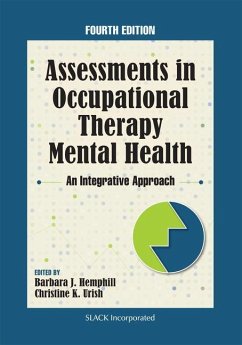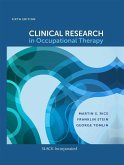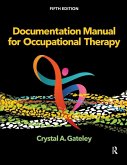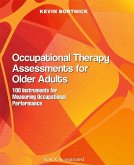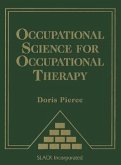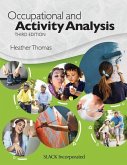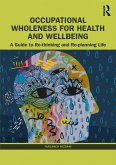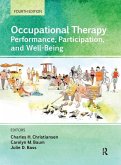Barbara J Hemphill, Christine K Urish
Assessments in Occupational Therapy Mental Health
An Integrative Approach
Barbara J Hemphill, Christine K Urish
Assessments in Occupational Therapy Mental Health
An Integrative Approach
- Gebundenes Buch
- Merkliste
- Auf die Merkliste
- Bewerten Bewerten
- Teilen
- Produkt teilen
- Produkterinnerung
- Produkterinnerung
Provides a unique compilation of mental health assessments that are taught in occupational therapy academic programs and used in clinical practice. This fourth edition presents knowledge about the evaluation process, assessments that are current and accurate, and how to generate research for developing assessment tools
Andere Kunden interessierten sich auch für
![Clinical Research in Occupational Therapy, Sixth Edition Clinical Research in Occupational Therapy, Sixth Edition]() Martin S. RiceClinical Research in Occupational Therapy, Sixth Edition153,99 €
Martin S. RiceClinical Research in Occupational Therapy, Sixth Edition153,99 €![Documentation Manual for Occupational Therapy Documentation Manual for Occupational Therapy]() Crystal GateleyDocumentation Manual for Occupational Therapy94,99 €
Crystal GateleyDocumentation Manual for Occupational Therapy94,99 €![Occupational Therapy Assessments for Older Adults Occupational Therapy Assessments for Older Adults]() Kevin BortnickOccupational Therapy Assessments for Older Adults102,99 €
Kevin BortnickOccupational Therapy Assessments for Older Adults102,99 €![Occupational Science for Occupational Therapy Occupational Science for Occupational Therapy]() Doris PierceOccupational Science for Occupational Therapy151,99 €
Doris PierceOccupational Science for Occupational Therapy151,99 €![Occupational and Activity Analysis Occupational and Activity Analysis]() Heather ThomasOccupational and Activity Analysis120,99 €
Heather ThomasOccupational and Activity Analysis120,99 €![Occupational Wholeness for Health and Wellbeing Occupational Wholeness for Health and Wellbeing]() Farzaneh YazdaniOccupational Wholeness for Health and Wellbeing33,99 €
Farzaneh YazdaniOccupational Wholeness for Health and Wellbeing33,99 €![Occupational Therapy Occupational Therapy]() Charles H. ChristiansenOccupational Therapy172,99 €
Charles H. ChristiansenOccupational Therapy172,99 €-
-
-
Provides a unique compilation of mental health assessments that are taught in occupational therapy academic programs and used in clinical practice. This fourth edition presents knowledge about the evaluation process, assessments that are current and accurate, and how to generate research for developing assessment tools
Hinweis: Dieser Artikel kann nur an eine deutsche Lieferadresse ausgeliefert werden.
Hinweis: Dieser Artikel kann nur an eine deutsche Lieferadresse ausgeliefert werden.
Produktdetails
- Produktdetails
- Verlag: SLACK Incorporated
- 4 Revised edition
- Seitenzahl: 652
- Erscheinungstermin: 6. August 2020
- Englisch
- Abmessung: 259mm x 185mm x 36mm
- Gewicht: 1344g
- ISBN-13: 9781630918132
- ISBN-10: 163091813X
- Artikelnr.: 60076426
- Herstellerkennzeichnung
- Libri GmbH
- Europaallee 1
- 36244 Bad Hersfeld
- 06621 890
- Verlag: SLACK Incorporated
- 4 Revised edition
- Seitenzahl: 652
- Erscheinungstermin: 6. August 2020
- Englisch
- Abmessung: 259mm x 185mm x 36mm
- Gewicht: 1344g
- ISBN-13: 9781630918132
- ISBN-10: 163091813X
- Artikelnr.: 60076426
- Herstellerkennzeichnung
- Libri GmbH
- Europaallee 1
- 36244 Bad Hersfeld
- 06621 890
Barbara J. Hemphill, DMin, OTR, FAOTA, received her Bachelor of Science degree in occupational therapy from the University of Iowa. She received her Master of Science degree in occupational therapy from Colorado State University. During her tenure as a therapist at Ft. Logan Mental Health Center, she was fortunate to work with Dr. Maxwell Jones, the founder of the Therapeutic Community Concept in mental health, and developed the B.H. Battery, a projective test based on analytical frame of reference. She began her teaching career at Cleveland State University. She became an associate professor and tenured in the department of occupational therapy at Western Michigan University. She retired emeritus after 19 years. In addition to her degrees, she has an earned Doctor of Ministry degree from the Ecumenical Theological Seminary in Detroit. Dr. Hemphill has served on the editorial boards of the Occupational Therapy Practice Journal and the American Journal of Occupational Therapy and presently serves on the editorial board of the Occupational Therapy in Mental Health journal. She has written numerous international, national, and state peer-reviewed papers. Her papers include two at the World Federation for Occupational Therapy: one entitled "Holism in Occupational Therapy" and the second entitled "Occupational Therapy and Spirituality: A Global Perspective." She has presented numerous papers at national occupational therapy conferences. Among them are: "Methods in Spirituality: An Educational Experience," "Spirituality in the Treatment Setting," "Spirituality in the Health Care Setting," and "Spirituality as an Occupation." At the state level, she has presented papers at the Michigan Occupational Therapy conference, and her presentations have included "Spiritual Assessments in the Treatment Setting" and "Spirituality With the Intellectual Disabled." Her publication record has spanned over 25 years. Her most proud accomplishment is having edited books on the topic of mental health assessment. Among them are The Evaluative Process in Psychiatric Occupational Therapy, which was translated into Japanese; Mental Health Assessment in Occupational Therapy; and Assessments in Occupational Therapy Mental Health. She has published in the American Journal of Occupational Therapy and Occupational Therapy in Mental Health. The topics range from marketing to depression to deinstitutionalization. Her most recent publication focused on social justice and spirituality in occupational therapy. She has been recognized for her contributions to education, research, and publications. She has served on state and national committees, most notably serving as chair of the Ethics Commission of the American Occupational Therapy Association. Her awards include Fellow of the American Occupational Therapy Association, as well as Fellow of the Michigan Occupational Therapy Association. She was recently named among the most 100 influential occupational therapists in the past century. Dr. Hemphill continues to contribute to her profession after retirement. She has taught courses in spirituality to occupational therapy students online and in the classroom. Her ministry is in the community. She has taught spirituality courses at senior centers and retirement homes. She also taught a series of courses about C.S. Lewis and a PBS course entitled "A Question of God," a debate between Freud and C.S. Lewis. Christine K. Urish, PhD, OTR/L, BCMH, FAOTA, graduated from Western Michigan University in 1989 with a Bachelor of Science degree in occupational therapy. She began her career working as an occupational therapist at an inpatient psychiatric setting and inpatient/outpatient addiction treatment providing treatment to clients across the lifespan. She completed her Master of Science degree in 1993 and returned to clinical practice. In 1994, she began her career in higher education at St. Ambrose University, teaching in occupational therapy until June 2018. At present, Dr. Urish is a professor of occupational therapy at Drake University. Christine completed her PhD from the University of Iowa in 2005. Along the way, she has worked with the most amazing mentors, including Dr. Barbara Hemphill, who was a motivating and encouraging force in her career from the early days at Western Michigan University, at the start of her clinical practice, throughout the completion of her PhD, and to the present day. Another mentor, Dr. Vilia Tarvydas, encouraged her early writing career. Dr. Urish continues to engage in clinical practice as an occupational therapist in behavioral health at the University of Iowa Hospitals & Clinics. Dr. Urish is Board certified as an occupational therapist in mental health by the American Occupational Therapy Association and is a Fellow of the American Occupational Therapy Association. Dr. Urish has served in the past as affiliate President for the National Alliance on Mental Illness and as President of the Iowa Occupational Therapy Association. Dr. Urish is a tireless advocate for individuals with mental illness, the profession of occupational therapy, and occupational therapy students.
Dedication Acknowledgments About the Editors Contributing Authors Preface
Foreword Part I: Introduction Chapter 1: Assessment in Occupational Therapy
Chapter 2: Evidence-Based Practice and Assessment in Occupational Therapy
Part II: The Interviewing Process Chapter 3: Occupational Profile and
Interviewing in Occupational Therapy Chapter 4: Client-Centered Assessment:
The Canadian Occupational Performance Measure Chapter 5: Social Profile:
Assessment of Social Participation in Children, Adolescents, and Adults
Chapter 6: Activity Card Sort as an Essential Tool to Obtain an
Occupational History and Profile in Individuals With Mental Health
Challenges Part III: Psychological Assessments Chapter 7: Writing as an
Assessment Tool in Mental Health Chapter 8: Creative Participation
Assessment Chapter 9: The Kawa (River) Model: Culturally Relevant
Assessment in Occupational Therapy Mental Health Practice Part IV:
Cognitive Assessments Chapter 10: Performance-Based Assessments and
Neuropsychological Assessments: A Comparison Chapter 11: Cognitive
Disabilities Model: Allen Cognitive Level Screen-5 and Allen Diagnostic
Module (2nd Edition) Assessments Chapter 12: Routine Task
Inventory-Expanded Chapter 13: Contextual Memory Test Chapter 14: Weekly
Calendar Planning Activity Chapter 15: The Executive Function Performance
Test Part V: Behavioral Assessments Chapter 16: Assessments Used Within the
Model of Human Occupation Chapter 17: The Assessment of Occupational
Functioning-Collaborative Version Chapter 18: Role Assessments Used in
Mental Health Chapter 19: Australian Therapy Outcome Measures for
Occupational Therapy: A Measure of Global Client Outcomes Part VI: Learning
Assessments Chapter 20: The Performance Assessment of Self-Care Skills
Chapter 21: The Comprehensive Occupational Therapy Evaluation Chapter 22:
The Independent Living Scales Chapter 23: Kohlman Evaluation of Living
Skills Chapter 24: Work-Related Assessments: The Worker Role Interview,
Work Environment Impact Scale, and Assessment of Work Performance Chapter
25: The Test of Grocery Shopping Skills Part VII: Biological Assessments
Chapter 26: Adolescent/Adult Sensory Profile Chapter 27: Spiritual
Assessments in Mental Health Occupational Therapy Chapter 28: The OT-QUEST:
The Occupational Therapy Quality of Experience and Spirituality Assessment
Tool Part VIII: Additional Assessments Chapter 29: Measuring Life Balance
Chapter 30: Goal Attainment Scale Chapter 31: Stress Management
QuestionnaireAppendices Appendix A: Writing as an Assessment Tool in Mental
Health: Resources Appendix B: Creative Participation Assessment Appendix C:
Routine Task Inventory-Expanded Appendix D: Role Assessment Used in Mental
Health Appendix E: The Performance Assessment of Self-Care Skills Appendix
F: Definitions of Terms for the Comprehensive Occupational Therapy
Evaluation Scale Appendix G: KidCOTE Appendix H: List of Spiritual
Assessments Appendix I: Life Balance Inventory Indices Assessment Index
Author Index Subject Index Financial Disclosures
Foreword Part I: Introduction Chapter 1: Assessment in Occupational Therapy
Chapter 2: Evidence-Based Practice and Assessment in Occupational Therapy
Part II: The Interviewing Process Chapter 3: Occupational Profile and
Interviewing in Occupational Therapy Chapter 4: Client-Centered Assessment:
The Canadian Occupational Performance Measure Chapter 5: Social Profile:
Assessment of Social Participation in Children, Adolescents, and Adults
Chapter 6: Activity Card Sort as an Essential Tool to Obtain an
Occupational History and Profile in Individuals With Mental Health
Challenges Part III: Psychological Assessments Chapter 7: Writing as an
Assessment Tool in Mental Health Chapter 8: Creative Participation
Assessment Chapter 9: The Kawa (River) Model: Culturally Relevant
Assessment in Occupational Therapy Mental Health Practice Part IV:
Cognitive Assessments Chapter 10: Performance-Based Assessments and
Neuropsychological Assessments: A Comparison Chapter 11: Cognitive
Disabilities Model: Allen Cognitive Level Screen-5 and Allen Diagnostic
Module (2nd Edition) Assessments Chapter 12: Routine Task
Inventory-Expanded Chapter 13: Contextual Memory Test Chapter 14: Weekly
Calendar Planning Activity Chapter 15: The Executive Function Performance
Test Part V: Behavioral Assessments Chapter 16: Assessments Used Within the
Model of Human Occupation Chapter 17: The Assessment of Occupational
Functioning-Collaborative Version Chapter 18: Role Assessments Used in
Mental Health Chapter 19: Australian Therapy Outcome Measures for
Occupational Therapy: A Measure of Global Client Outcomes Part VI: Learning
Assessments Chapter 20: The Performance Assessment of Self-Care Skills
Chapter 21: The Comprehensive Occupational Therapy Evaluation Chapter 22:
The Independent Living Scales Chapter 23: Kohlman Evaluation of Living
Skills Chapter 24: Work-Related Assessments: The Worker Role Interview,
Work Environment Impact Scale, and Assessment of Work Performance Chapter
25: The Test of Grocery Shopping Skills Part VII: Biological Assessments
Chapter 26: Adolescent/Adult Sensory Profile Chapter 27: Spiritual
Assessments in Mental Health Occupational Therapy Chapter 28: The OT-QUEST:
The Occupational Therapy Quality of Experience and Spirituality Assessment
Tool Part VIII: Additional Assessments Chapter 29: Measuring Life Balance
Chapter 30: Goal Attainment Scale Chapter 31: Stress Management
QuestionnaireAppendices Appendix A: Writing as an Assessment Tool in Mental
Health: Resources Appendix B: Creative Participation Assessment Appendix C:
Routine Task Inventory-Expanded Appendix D: Role Assessment Used in Mental
Health Appendix E: The Performance Assessment of Self-Care Skills Appendix
F: Definitions of Terms for the Comprehensive Occupational Therapy
Evaluation Scale Appendix G: KidCOTE Appendix H: List of Spiritual
Assessments Appendix I: Life Balance Inventory Indices Assessment Index
Author Index Subject Index Financial Disclosures
Dedication Acknowledgments About the Editors Contributing Authors Preface
Foreword Part I: Introduction Chapter 1: Assessment in Occupational Therapy
Chapter 2: Evidence-Based Practice and Assessment in Occupational Therapy
Part II: The Interviewing Process Chapter 3: Occupational Profile and
Interviewing in Occupational Therapy Chapter 4: Client-Centered Assessment:
The Canadian Occupational Performance Measure Chapter 5: Social Profile:
Assessment of Social Participation in Children, Adolescents, and Adults
Chapter 6: Activity Card Sort as an Essential Tool to Obtain an
Occupational History and Profile in Individuals With Mental Health
Challenges Part III: Psychological Assessments Chapter 7: Writing as an
Assessment Tool in Mental Health Chapter 8: Creative Participation
Assessment Chapter 9: The Kawa (River) Model: Culturally Relevant
Assessment in Occupational Therapy Mental Health Practice Part IV:
Cognitive Assessments Chapter 10: Performance-Based Assessments and
Neuropsychological Assessments: A Comparison Chapter 11: Cognitive
Disabilities Model: Allen Cognitive Level Screen-5 and Allen Diagnostic
Module (2nd Edition) Assessments Chapter 12: Routine Task
Inventory-Expanded Chapter 13: Contextual Memory Test Chapter 14: Weekly
Calendar Planning Activity Chapter 15: The Executive Function Performance
Test Part V: Behavioral Assessments Chapter 16: Assessments Used Within the
Model of Human Occupation Chapter 17: The Assessment of Occupational
Functioning-Collaborative Version Chapter 18: Role Assessments Used in
Mental Health Chapter 19: Australian Therapy Outcome Measures for
Occupational Therapy: A Measure of Global Client Outcomes Part VI: Learning
Assessments Chapter 20: The Performance Assessment of Self-Care Skills
Chapter 21: The Comprehensive Occupational Therapy Evaluation Chapter 22:
The Independent Living Scales Chapter 23: Kohlman Evaluation of Living
Skills Chapter 24: Work-Related Assessments: The Worker Role Interview,
Work Environment Impact Scale, and Assessment of Work Performance Chapter
25: The Test of Grocery Shopping Skills Part VII: Biological Assessments
Chapter 26: Adolescent/Adult Sensory Profile Chapter 27: Spiritual
Assessments in Mental Health Occupational Therapy Chapter 28: The OT-QUEST:
The Occupational Therapy Quality of Experience and Spirituality Assessment
Tool Part VIII: Additional Assessments Chapter 29: Measuring Life Balance
Chapter 30: Goal Attainment Scale Chapter 31: Stress Management
QuestionnaireAppendices Appendix A: Writing as an Assessment Tool in Mental
Health: Resources Appendix B: Creative Participation Assessment Appendix C:
Routine Task Inventory-Expanded Appendix D: Role Assessment Used in Mental
Health Appendix E: The Performance Assessment of Self-Care Skills Appendix
F: Definitions of Terms for the Comprehensive Occupational Therapy
Evaluation Scale Appendix G: KidCOTE Appendix H: List of Spiritual
Assessments Appendix I: Life Balance Inventory Indices Assessment Index
Author Index Subject Index Financial Disclosures
Foreword Part I: Introduction Chapter 1: Assessment in Occupational Therapy
Chapter 2: Evidence-Based Practice and Assessment in Occupational Therapy
Part II: The Interviewing Process Chapter 3: Occupational Profile and
Interviewing in Occupational Therapy Chapter 4: Client-Centered Assessment:
The Canadian Occupational Performance Measure Chapter 5: Social Profile:
Assessment of Social Participation in Children, Adolescents, and Adults
Chapter 6: Activity Card Sort as an Essential Tool to Obtain an
Occupational History and Profile in Individuals With Mental Health
Challenges Part III: Psychological Assessments Chapter 7: Writing as an
Assessment Tool in Mental Health Chapter 8: Creative Participation
Assessment Chapter 9: The Kawa (River) Model: Culturally Relevant
Assessment in Occupational Therapy Mental Health Practice Part IV:
Cognitive Assessments Chapter 10: Performance-Based Assessments and
Neuropsychological Assessments: A Comparison Chapter 11: Cognitive
Disabilities Model: Allen Cognitive Level Screen-5 and Allen Diagnostic
Module (2nd Edition) Assessments Chapter 12: Routine Task
Inventory-Expanded Chapter 13: Contextual Memory Test Chapter 14: Weekly
Calendar Planning Activity Chapter 15: The Executive Function Performance
Test Part V: Behavioral Assessments Chapter 16: Assessments Used Within the
Model of Human Occupation Chapter 17: The Assessment of Occupational
Functioning-Collaborative Version Chapter 18: Role Assessments Used in
Mental Health Chapter 19: Australian Therapy Outcome Measures for
Occupational Therapy: A Measure of Global Client Outcomes Part VI: Learning
Assessments Chapter 20: The Performance Assessment of Self-Care Skills
Chapter 21: The Comprehensive Occupational Therapy Evaluation Chapter 22:
The Independent Living Scales Chapter 23: Kohlman Evaluation of Living
Skills Chapter 24: Work-Related Assessments: The Worker Role Interview,
Work Environment Impact Scale, and Assessment of Work Performance Chapter
25: The Test of Grocery Shopping Skills Part VII: Biological Assessments
Chapter 26: Adolescent/Adult Sensory Profile Chapter 27: Spiritual
Assessments in Mental Health Occupational Therapy Chapter 28: The OT-QUEST:
The Occupational Therapy Quality of Experience and Spirituality Assessment
Tool Part VIII: Additional Assessments Chapter 29: Measuring Life Balance
Chapter 30: Goal Attainment Scale Chapter 31: Stress Management
QuestionnaireAppendices Appendix A: Writing as an Assessment Tool in Mental
Health: Resources Appendix B: Creative Participation Assessment Appendix C:
Routine Task Inventory-Expanded Appendix D: Role Assessment Used in Mental
Health Appendix E: The Performance Assessment of Self-Care Skills Appendix
F: Definitions of Terms for the Comprehensive Occupational Therapy
Evaluation Scale Appendix G: KidCOTE Appendix H: List of Spiritual
Assessments Appendix I: Life Balance Inventory Indices Assessment Index
Author Index Subject Index Financial Disclosures

